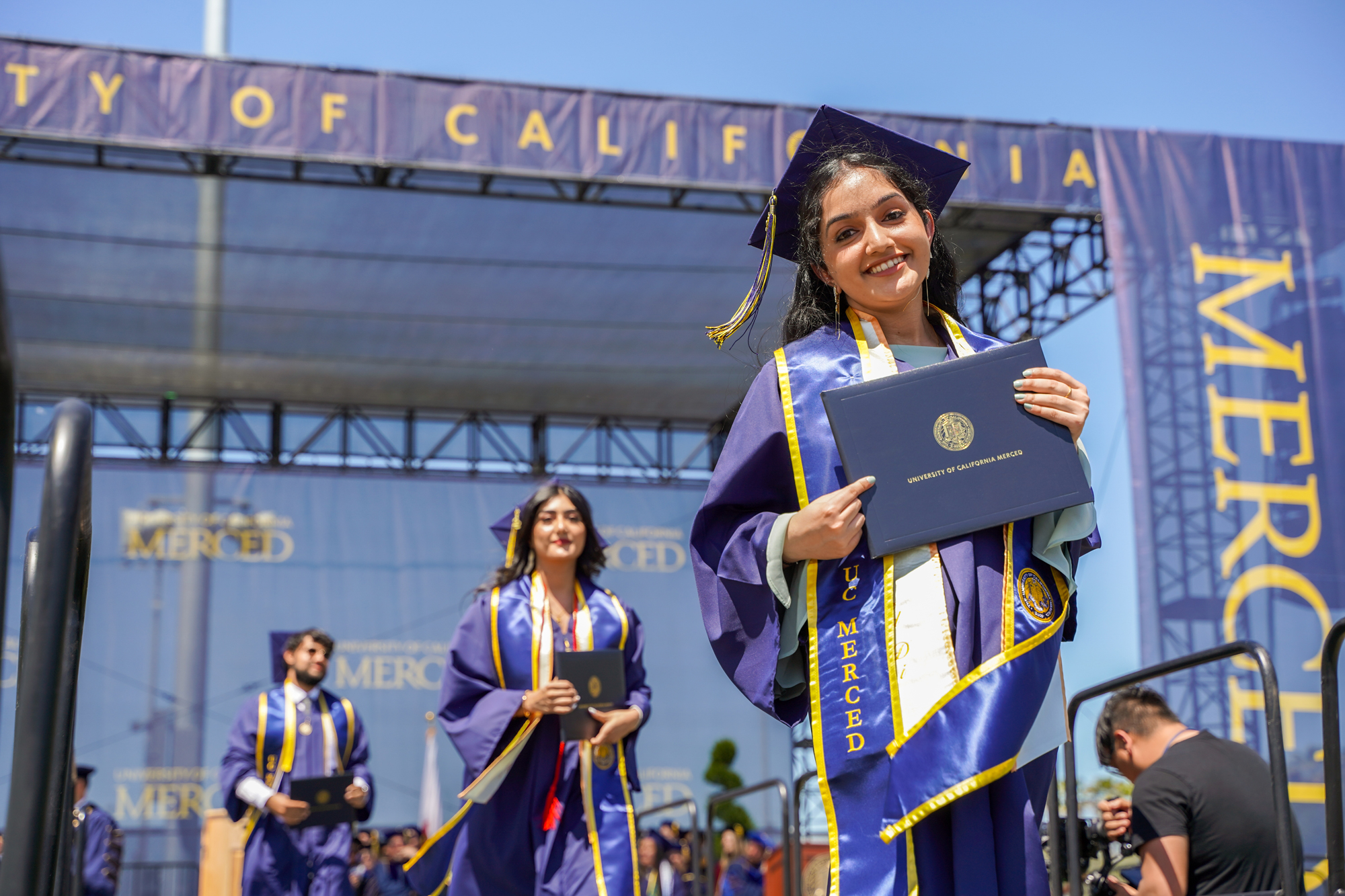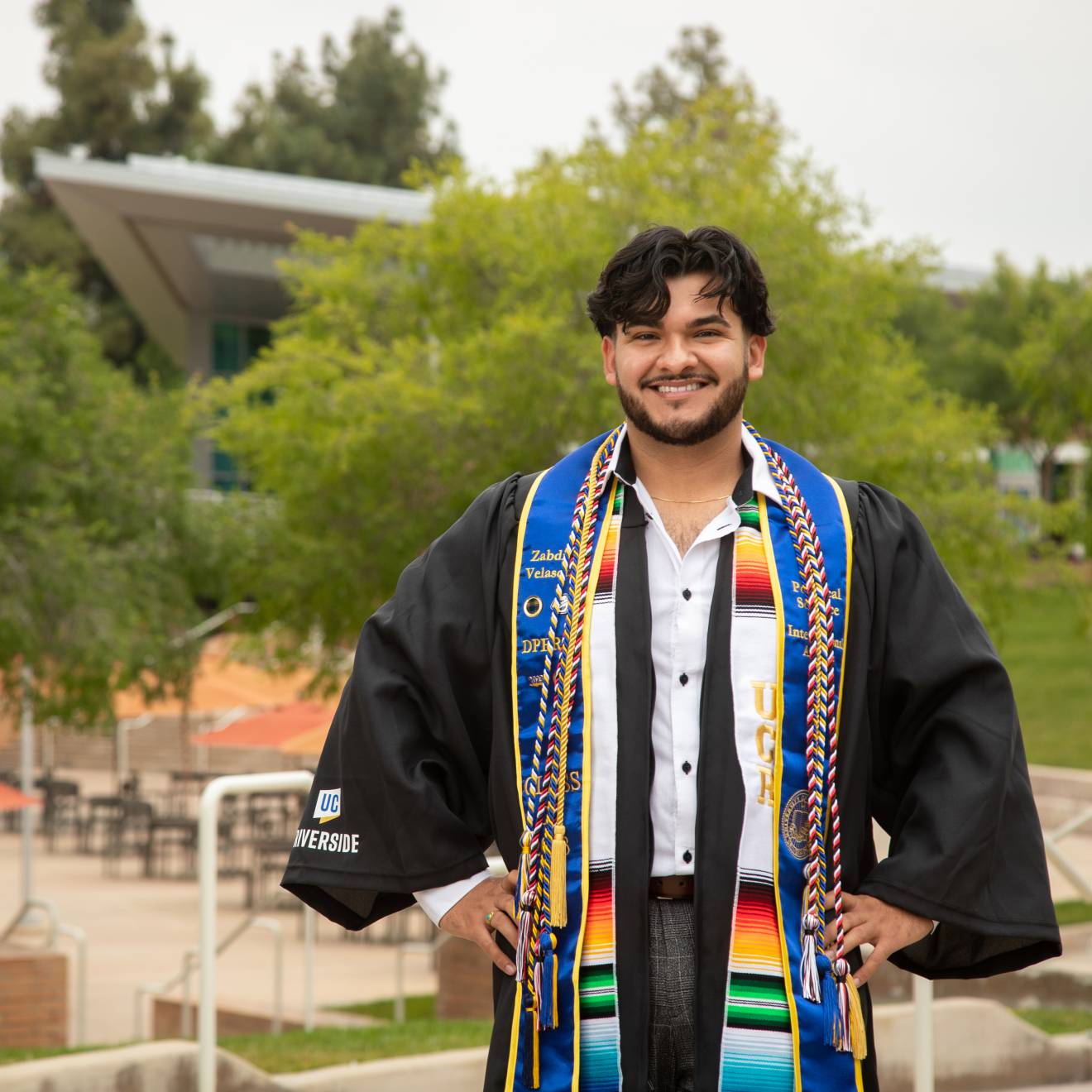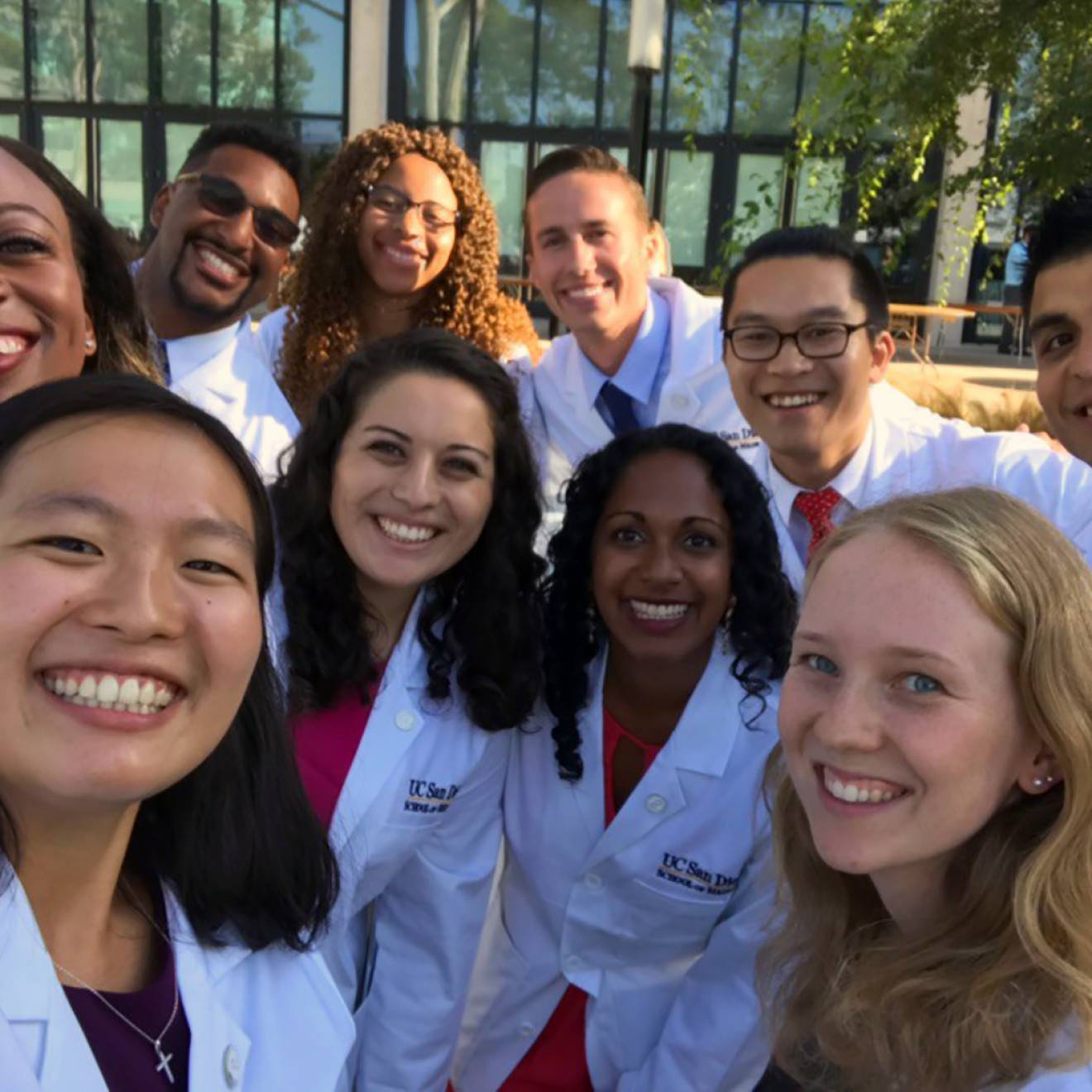Thousands of mortarboards will fly skyward this spring as roughly 65,800 seniors become newly minted college grads, joining the ranks of UC’s two million intrepid alumni.
By any measure, the class of 2023 has a lot to celebrate. In addition to the usual ups and downs of a college journey, they persevered through the pandemic, with its unprecedented upheavals and loss. Returning to campus in person, they pushed through these challenges to immerse themselves in learning, community and connection.
One notable bragging right of the class of 2023 — more than 41 percent are among the first generation in their families to earn a university degree. Much more than a dry statistic, it’s a significant number that represents the life-changing promise of education and the role UC plays in creating a brighter future for a wide swath of Californians.
This year’s 27,000 first-generation graduates each bring their own unique spark to UC’s collective fiat lux. Their diplomas speak of ambition, determination and purpose, of knowledge, optimism and opportunity — and careers that will span every industry. Read on to meet a handful of UC’s newest first-gen grads. (Click the links for a shortcut to each.)
UC Berkeley: Hatcher Parnell, A diploma 27 years in the making
UC Davis: Eduardo Landicho, Leading a conversation on accessibility
UC Irvine: Jessica Cai, Taking the next step in ed tech
UCLA: Thien Nguyen, Research with real-world impact
UC Merced: Kimberly Farias, Inspired by experience
UC Riverside: Zabdi R. Velásquez, Giving back what he received
UC Santa Barbara: Anabel Rocha Ambrosio, Building a better life
UC Santa Cruz: Miguel Tamayo, Turning a negative into a positive
UC San Diego: Montana Gray, Living a dream come true
When Hatcher Parnell started at UC Berkeley in 1991, he was the first in his family to go to college. Just a few credits short of that goal, he walked in the 1996 commencement ceremony with the aim of finishing up that year. But then life intervened, money got tight, and Parnell put aside his studies to pay the bills. Parnell never forgot about that diploma, though, and now, 27 years later, the 50-year-old has come full circle to graduate.
The impetus? Parnell was presented with a dream career opportunity heading a new office of executive protection at the University of Southern California (USC). But he was missing the needed degree. Encouraged by a supervisor, Parnell set up a flexible schedule that allowed him to continue working in Los Angeles while also attending school in Berkeley. A true super commuter, he traveled by car, plane, and train two grueling days a week for a year to finish his last few classes. Over a hundred flights later, he’s achieved the dream, including embarking on the next phase of his career with USC.
What’s next? Parnell is already at work in his new job as director of the Office of Executive Protection services at USC.
Eddie Landicho started his UC Davis career in remote classes, immersing himself in design from day one. But when he arrived on campus in his second year, he found an unexpected surprise. Many older buildings, including the design department’s home, Cruess Hall, were at times unworkable for someone navigating the world in a wheelchair, he said, despite having been retrofitted for accessibility. Those day-to-day limitations became a source of inspiration and purpose for Landicho. “I started to see a lot of problems with accessibility that were not being talked about,” he says. “So I shifted my design focus to architecture and accessibility, because I live it.”
Landicho was born with an extremely rare form of muscular dystrophy and has been using a wheelchair exclusively since the age of five. Growing up in Porterville, in the San Joaquin Valley, Landicho didn’t feel like “a kid with a disability.” His mom and dad had no experience with physical disability. “They were basically winging it,” Landicho says. Yet they were determined that their son have every opportunity possible. When it was time for college, Landicho’s family supported him all the way — his mom even moved to Davis to care for him while he went to school.
“My mom was always there to say, ‘If you want to do it, let’s do it.’ And my dad would always tell me, ‘If you want to achieve this goal, you’ve got to work for it. But I don’t see you not achieving it.’ That nurturing allowed me to be who I truly wanted to be.”
In the design community at UC Davis, Landicho worked to open a dialogue around accessibility, bringing attention to the challenges the built environment can present and talking about how design can facilitate inclusion and belonging.
“I want to change how we look at infrastructure today and make it much more inclusive for those with disabilities,” he says. For an independent study project his senior year, Landicho revisited the architecture of Cruess Hall. In his “Re-Accessibility Project,” an elegant circular ramp is integrated into the building’s façade. “You have the option of taking the ramp all the way to the second floor. It’s not added on as a last-minute thing. It’s integrated into the building in a way that is very beautiful and powerful.”
Wrapping up at UC Davis, Landicho is bringing the accessibility conversation to a wider stage as a TEDxUCDavis presenter and 2023 commencement speaker.
What’s next? Landicho plans to work in the architecture, design and accessibility field before attending graduate school in design.
Watch Eddie Landicho’s TEDxUCDavis talk on accessible design.
Jessica Cai’s interest in educational technology developed long before most of us were introduced to the idea of remote school during the pandemic. She attended online school for years, working around a rigorous training schedule in competitive figure skating and dance. By the time she started at Irvine Valley College and the Covid shutdowns hit, she was already well versed in remote learning.
Transferring to UC Irvine, she combined that experience with a facility in media making, pursuing ed tech with several research labs on campus. Cai even created an online math course for fifth and sixth graders that’s currently being used in four Orange County schools. Among the opportunities that most shaped Cai’s career at Irvine: mentorships. “My mentor, Joseph Wong, is my biggest influence at UC Irvine. I was super lucky to have met him. He really helped guide my research/academic journey so far and helped me get closer to ed tech research.”
What’s next? Cai will pursue a Master of Education in the Learning Design, Innovation and Technology program at Harvard this fall.
Thien Nguyen moved to Orange County from Vietnam with her family when she was 18, learning English and figuring out how to navigate the American educational system as a student at Orange Coast College. When her mother developed cancer that same year, Nguyen stayed in school, but juggled her studies with supporting her family financially. Persisting through a second year of community college, Nguyen landed a job as a clinical research coordinator at a clinic for gastrointestinal diseases. Her hard work led to a transfer scholarship to UCLA, where the results of her research on minimizing the side effects of immunotherapy will have real-world impact.
Like many first-gen students who give back to their communities, Nguyen regularly visits Orange Coast College to talk with students about opportunities at UCLA. She also worked with the Undergraduate Journal Club at UCLA, giving presentations to help underrepresented students find research opportunities and build the needed skills for graduate education. And she shared her experience with other transfer pre-med students through UCLA’s TransferMed group.
What’s next? This summer Nguyen heads to Harvard Medical School to join a research project on cancer and hepatitis B. Then she’s off to Cambridge University in England to study for a master’s degree in oncology.
Throughout her time at UC Merced, Kimberly Farias’s studies were guided by her life experience. With her mother from Cihuatlán, Jalisco, and her father from Colima, Mexico, Farias grew up in immigrant communities, witnessing firsthand how immigration laws affect real people. At UC Merced, she focused her political science honors thesis on the impact of Trump-era zero-tolerance immigration policies and family separations. Her studies in psychology were also driven by real-world experience. As a first-generation student whose parents didn’t finish high school, Farias experienced imposter syndrome, doubting her place in the academic world — an all-too-common feeling among first-gen students. Not only did she work through it, she wrote her psychology honors thesis on the topic.
Farias plans to pursue a doctorate in political science and then go to law school, with the goals of becoming a political science professor and an immigration lawyer. “I hope to use my education and experiences to serve and advocate for underrepresented minority communities and first-generation students,” she says. She’s already on her way, interning for the External Affairs Office of Gov. Gavin Newsom as part of the Maddy Legislative Internship Program, publishing research papers as an undergrad and being selected as the student speaker for the UC Merced 2023 commencement.
What’s next? Farias is currently working as a researcher in political science and psychology at UC Merced and plans to attend graduate school in political science and law.
“What surprised me most about my experience here was just how everything worked out,” laughs Zabdi Velásquez, looking back on his two years at UC Riverside. Velásquez grew up in the small desert city of Brawley in California’s Imperial Valley, just south of the Salton Sea. “Neither of my parents completed what’s equivalent to middle school back in Mexico. So when they immigrated to the United States, they instilled in me the importance of getting an education.”
For Velásquez, higher education was a primary goal from a young age. He began at his local community college, with his sights on eventually transferring to a university and attending graduate school. “I faced a lot of obstacles growing up and being first-gen and low income, the COVID pandemic,” says Velásquez. “Coming out of that and transferring here — I’ve been incredibly lucky with all the opportunities I’ve had.”
When Velásquez enrolled in Kim Yi Dionne’s Ethnic Politics in Comparative Perspective course, he not only loved the class, but also found a mentor in professor Dionne. At the end of the quarter, she asked him to join the Dionne Publicly Engaged Research Lab. The lab brought more opportunities — publishing a paper in a peer-reviewed scholarly journal, for instance — along with a supportive community of other first-gen, low-income and minority students.
Velásquez likes to call the community of family, faculty and students who cheered him through UC Riverside “my little village.” The support of this network was instrumental not only in navigating classes, financial aid and research opportunities, but also in dealing with transfer shock and impostor syndrome, which are commonly experienced by first-generation and transfer students. “I’m incredibly blessed to say this, but now I actually coach other kids,” he reflects. “I do presentations with incoming transfer students to guide them through the process. Giving back what you received — it’s awesome.”
With encouragement from professor Dionne, Velásquez applied to graduate school. This fall, he’ll start work on a Ph.D. in political science at UCLA, where he was awarded the prestigious Eugene V. Cota-Robles Fellowship and selected for the Competitive Edge Summer Bridge Program, a six-week intensive for newly admitted doctoral students from underrepresented backgrounds. He plans to study how the global resource extraction industry impacts local communities, like the lithium “gold rush” unfolding near his hometown. And thanks to UC’s generous financial aid package for low-income students, he’ll be starting his new journey debt-free. His ultimate goal: to become a professor and help other students, just as he was helped.
What’s next? Velásquez begins his doctoral studies in political science at UCLA this fall, where he will focus on race, ethnicity and politics.
Read more about Zabdi Velasquez and his UCR classmates.
Anabel Rocha Ambrosio moved to the United States with her parents from Tijuana, Mexico, at the age of two. Like many immigrants, the family was seeking a better life, especially for their young daughter. After living through the stress of a childhood as an undocumented immigrant, Ambrosio received her DACA status in high school. Now, she is first in her family to graduate from college and will receive a University Service Award honoring her academic success and campus involvement.
Ambrosio’s family didn’t have the resources to send her to college, but she was determined and applied for every scholarship she could find. “Somehow I made it in, and I got enough money for a full ride,” she says. Part of the support came from UC Santa Barbara’s Promise Scholars program, which provided financial help as well as mentorships, workshops and opportunities for Ambrosio to help other students. Ambrosio also received support from Undocumented Student Services (USS). With the guidance of her USS mentor, Malaphone Phommasa, Ambrosio co-founded the UC Santa Barbara chapter of the Tri-Alpha National Honors Society for first-generation students.
What’s next? Ambrosio is taking a gap year before attending grad school. She was recently accepted to UC Santa Barbara’s intensive Teacher Education Program, where students earn both a teaching credential and master’s degree.
Born in Medellín, Colombia, Miguel Tamayo moved to the United States with his mom and brother just shy of his 12th birthday. Learning English was difficult at first, and other kids teased him for his thick accent. “At some point, I learned that my accent tells my story, and it represents other people who have come here from another country. Now, instead of looking at it as a burden, something to be ashamed of, I look at it as something I’m proud of.” Tamayo’s ability to turn a negative into a positive, or to “fix problems,” as he puts it, has fueled his educational and career achievements, too.
From an early age, Tamayo was fascinated with mechanical objects and electronic devices, and especially all the components and circuit boards inside them. His family jokingly nicknamed him “Destroyer” for his penchant for taking things apart to try to figure out how they worked. (Reassembling was another story.) Now, graduating from UC Santa Cruz, Tamayo jokes, “I guess one of the satisfactions of being an engineer now is that I can open things up and I can put them back together again, too.”
As a high school student in South Central Los Angeles, Tamayo got his first tase of coding and tech classes through Upward Bound. He became a co-captain for his school robotics team, spending countless hours building bots. Meanwhile, his older brother, Juan, headed off to study computer engineering at San Jose State University. A role model for Tamayo, Juan would tell him what he was working on in his classes. Then Tamayo would research the topics, taking online tutorials and trying to build things on his own.
The sparks of inspiration were already flying when a science teacher showed Tamayo’s class a video on SpaceX. “It just flipped a switch in me,” he recalls. “That was the moment I decided I wanted to work with rockets.” Encouraged by his family to follow his passion, he applied to UC Santa Cruz. Before embarking on his college journey, Tamayo won a competitive summer internship at The Aerospace Corporation. It was a pivotal move. He has continued to intern there every summer, his responsibilities growing and shifting with his knowledge and interests, and he’ll start a staff role with the company after graduation.
Tamayo cites two programs for first-gen and low-income students at UC Santa Cruz that were instrumental in his success, EOP (Educational Opportunity Programs) and MESA (Mathematics, Engineering, Science Achievement). “It felt like a home apart from home,” says Tamayo. And that support inspired him to think about how he can help other disadvantaged students in turn. “Apart from my job,” he says, “I want to go back to low-income areas and set up after-school programs to introduce students to STEM. I want to show students that STEM is nothing to be afraid of, and that everybody’s capable.”
What’s next? After graduation, Tamayo will start a new job as a controls engineer with the same Southern California aerospace firm where he began as a pre-college intern.
Montana Gray wasn’t expecting anything but a run-of-the-mill college advising appointment. A mother of three young children and a first-generation college student, Gray returned to community college in the early days of the pandemic. She was surprised to learn from her advisor that she’d nearly completed the general education requirements to transfer to UC. Gray quickly got to work on her application and joined the UC San Diego community in September of 2021.
“Despite being a student of a ‘non-traditional’ age, I always felt uplifted with unconditional support from my peers and professors at UC San Diego,” Gray explained. “The confidence I gained through the university community and the support it provided really motivated me to succeed.” Gray’s next step is grad school, and then she hopes to land a career serving as a liaison between the United States and Japan.
What’s next? Gray is moving north this fall to begin her Ph.D. in East Asian studies at Stanford University.
Excerpted from UC San Diego Today. Read more about Montana Gray.
Banner image credit: Monique De Villa, UC Merced


